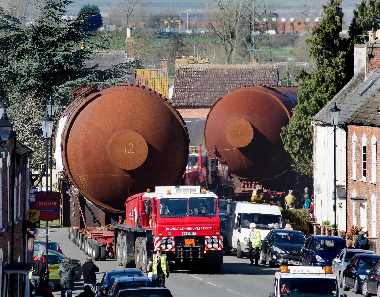Bon voyage to Berkeley boilers
20 March 2012
Life in a small English town was brought to a standstill as two massive boilers from the decommissioned Berkeley nuclear power plant started their journey to Sweden where they will be recycled.
 |
| The massive boilers make their way through the streets of Berkeley (Image: Magnox) |
Local roads were closed to traffic as the boilers, each 21.3 metres long, 5 metres wide and weighing in at 310 tonnes, were transported at walking pace through Berkeley town centre on their way to Sharpness docks, a few miles up the coast from the power station. From Sharpness, the boilers were shipped by barge down the River Severn to the major port of Avonmouth for transfer to a sea-going vessel for their onward journey to Sweden.
Berkeley's two Magnox reactors operated from the early 1960s until the late 1980s. In 2010, after 21 years of decommissioning work, the units became the first to be sealed up and placed in 'safestor', a passive state in which the defuelled and extensively decommissioned units will be monitored and maintained until the site is completely cleared in about 65 years' time.
The plant's 15 boilers, also referred to as heat exchangers, have been stored on their sides outside the reactor buildings since the 1990s. Original decommissioning plans called for them to remain in place until the final clearance of the site in 2074, when they would have been disposed of as low-level radioactive waste at the UK's national low-level waste repository. However, under a contract signed with UK LLW Repository Ltd (LLWR) in 2011, Swedish recycling specialist Studsvik is to transport five of the redundant boilers to its purpose built decontamination and recycling facility in Nyköping, Sweden, where they will be dismantled, smelted and recycled. Up to 90% of their metal content will ultimately be released for re-use in the metal market.
Removing and recycling the boilers rather than treating them as waste not only achieves the accelerated removal of legacy waste from the site, it also relieves future pressure on space in the UK's waste repository. Berkeley site director Steve McNally praised the project's "great environmental credentials," while LLWR managing director Dennis Thompson praised the cross-company collaborations involving heavy lifting contractor ALE and Studsvik as well as companies from across the estate of the UK Nuclear Decommissioning Authority (NDA) that had made the shipment possible. "It demonstrates what we can do when we put our mind to working collaboratively," he said.
The fate of the remaining ten boilers has yet to be decided, although Berkeley site contractor Magnox says it is looking to the supply chain for further options to remove these in the next financial year.
Researched and written
by World Nuclear News